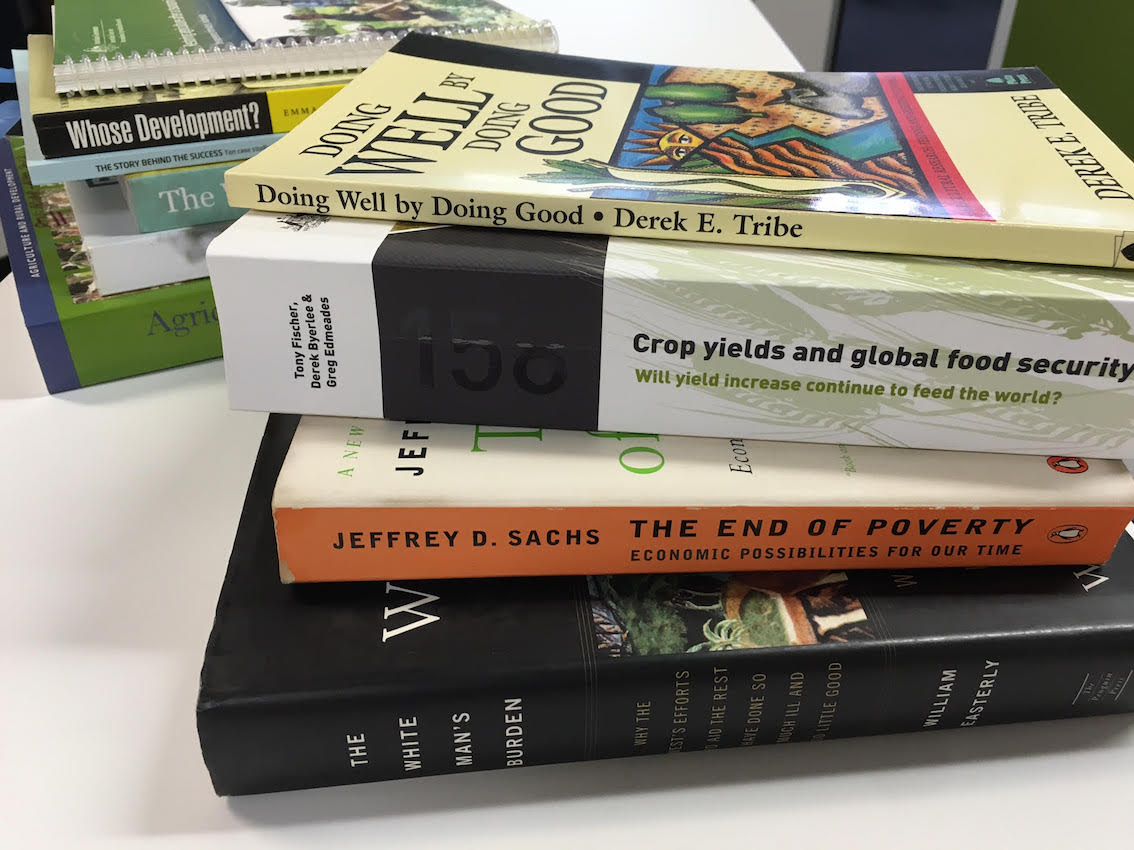RAIDs Good Reads List
Last year I attended a RAID event and was lucky enough to hear Tony Fisher’s advice for young researchers. Amongst his wise words and interesting life stories, he recommended good books for learning and being inspired.
I have taken this idea and expanded it slightly. Below is a list (in no particular order) of books and other texts that have been recommended by different people working in agriculture research and development.
Tony Fisher’s recommendations:
- Our Daily Bread, The Essential Norman Borlaug, author D.C. Noel Vietmeyer.
Our Daily Bread shows why Borlaug should be a household name. It is the story of how one man saved billions from certain hunger. And it shows how we too got our daily bread. It’s also been called the world’s first cereal thriller.
- Doing Well by Doing Good, author Derek Tribe.
An eloquent and influential argument for agricultural research abroad. Rather than a technical report, the book is an accessible read intended for politicians and farmers, responding to domestic fears that the information and benefits from Australian know-how were being given away as part of foreign aid. (extract from Research for the Developing World: Public Funding from Australia, Canada and the UK. Written by Bruce Currie-Alder)
- Crop yields and global food security: will yield increase continue to feed the world? Authors Tony Fisher, Derek Byerlee and Greg Edmeades.
This is an invaluable reference book on the opportunities for crop yield increase to feed the world to 2050. Written by three world-renowned agricultural scientists, it is aimed at agricultural scientists and economists, decision-makers in the food production industry, concerned citizens and tertiary students. Available from the ACIAR website.
From the economists:
- Poor Economics (2011). Authors Abhijit V. Banerjee and Esther Duflo.
For more than fifteen years the authors have worked with the poor in dozens of countries spanning five continents, trying to understand the specific problems that come with poverty and to find proven solutions. Their book is radical in its rethinking of the economics of poverty, but also entirely practical in the suggestions it offers.
William Easterly and Jeffery Sachs have both written multiple books on the economics of development and have differing, often opposing, views on how best to achieve economic development.
William Easterly:
- The Tyranny of Experts: Economists, Dictators, and the Forgotten Rights of the Poor (Basic Books, 2014)
- The White Man’s Burden: Why the West’s Efforts to Aid the Rest Have Done So Much Ill and So Little Good (Penguin, 2006)
Jeffrey Sachs:
- The Age of Sustainable Development (2015)
- The End of Poverty (2005)
- Common Wealth (2008)
Practical reference texts:
- Purposeful Program Theory: Effective Use of Theories of Change and Logic Models (2011). Authors Sue C. Funnell and Patricia J. Rogers
Program theory is a model of how an intervention (e.g. research for development project) contributes to a chain of outputs and impacts (e.g. increased household income or nutritional security). It is a useful tool for designing and evaluating projects.
This book will help you define possible outputs, outcomes and impacts from your project, and assist in developing a monitoring and evaluation strategy. An invaluable resource for getting your head around all the buzz words and writing a successful project proposal!
http://au.wiley.com/WileyCDA/WileyTitle/productCd-0470478578.html
- Farming Systems and Poverty: Improving Farmers’ Livelihoods in a Changing World (2001). Authors John Dixon and Aidan Gulliver with David Gibbon.
Small farmers produce much of the developing world’s food. Yet they are generally much poorer than the rest of the population in these countries, and are less food secure than even the urban poor. Furthermore, although rapid urbanisation is taking place in many developing countries, farming populations in 2030 will not be much smaller than they are today. For the foreseeable future, therefore, dealing with poverty and hunger in much of the world means confronting the problems that small farmers and their families face in their daily struggle for survival.
This book presents the results of a joint FAO and World Bank study which contributed to the updating of the World Bank Rural Development Strategy.
- Scientific writing = thinking in words
This is a really useful resource for research students and scientists – anyone who might need to write a scientific paper. It mostly focuses on how to structure a scientific journal paper, and how to get your point across in a clear and easy to follow manner. Also covers presentation of results, posters, oral presentations and thesis writing. Very handy for coaching international colleagues through the process of writing and submitting a paper to a good quality international journal.
Blogs (other than RAID’s of course!)
DevPolicy particularly this post about a couple of good books!
ACIAR publishes a lot of great reports, practical guides and books. Check out ACIAR’s website for more.
What books/blogs/texts do you recommend?



